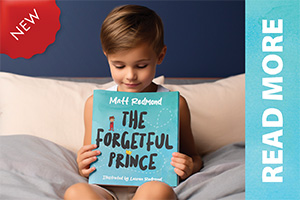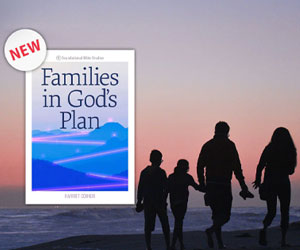
Blessed are the peacemakers: a lesson from Abigail
How 1 Samuel 25 can help us to understand and resolve sibling conflict.
Some days I feel less like a mother and more like a Captain in the Peace Corps. I’m sure you know what I mean. It starts with one child moving something, taking something, saying something or even implying something, then cycles through ‘I didn’t!’ and ‘You did!’. It then progresses to some pushing, shoving and maybe some screaming before I hear ‘MUUUUUUUM!!’
One day, when my children’s argument had escalated past shoving and into slapping, I found myself pulling the kids apart with a rather loud ‘ENOUGH!!’. They darted looks at each other that questioned whether Mum had finally gone round the bend. ‘Enough’, I said in a calmer voice, ‘Everyone take a breath. We really have to find a better way of dealing with conflict than this!’
I’d like to say that I just have spontaneous flashes of parenting awesomeness, but the truth is, I get most of my best parenting insights from the Bible. In God’s amazing providence, a few days before this incident I had come to 1 Samuel in my daily Bible reading. And chapter 25—the story of David, Nabal and Abigail—offers us a wonderful example of conflict management.
A story of peacemaking
I told my children the story of how David, still on the run from Saul, arrived with his men in Carmel. Nabal was a wealthy local landowner and David sent men to ask him for supplies. But that fired Nabal up. He refused to give David anything, treating him like a nobody. In turn, that insult fired David up. David then told his men to get their swords, intending to kill every man there.
Enter Abigail, Nabal’s wife. She could see where the situation was going, so she gathered up supplies in abundance and went out to meet David. When Abigail saw David, she bowed low before God’s appointed king and talked him out of violent revenge.
This incident helped me and my children to understand why conflicts arise and how they can be diffused.
The source of conflict
Conflicts arise, first of all, because of a weakness in our character. 1 Samuel 25:3 says that Nabal ‘was harsh and badly behaved’. The original Hebrew words give the impression of someone who was severe, stubborn and bent on destruction. Even Nabal’s name means ‘fool’. With character traits like that, this was not only an incident waiting to happen, but most probably an incident that had been repeated many times.
Apart from our flawed character, the thing that really ignites a conflict is weak impulse control. David is not blameless here: his fiery character meant that he acted on his impulse to fight. On top of that, David responded disproportionately: he took 400 of his 600 men, intent on killing everyone. When David realised where he had gone wrong, he praised God for sending Abigail who kept him ‘from working salvation with my own hand!’ (verse 33). Our human reflex is to resolve a conflict with our own strength—not God’s.
Changing our heart and behaviour
If our two problems are a flawed character and faulty impulse control, then we have two solutions: prayer and practice. We can’t change a harsh and badly behaved character overnight, so praying for a change in heart is the first step. When it comes to conflict between our children, prayer brings God into the solution and articulates the kind of character that he wants in his children.
The second response is practice. With God’s help, we need to train ourselves and our children to take a step back and ask ourselves the following questions.
Is what your brother/sister was doing or saying unreasonable?
If it wasn’t actually unreasonable (such as David’s request for supplies) then conflict can be avoided.
If so, why did you think it was unreasonable?
For Nabal, his character got in the way. We need to strip away the emotion and consider:
- Do I think it’s unreasonable because it would be dangerous or damaging, take unfair advantage of me or hurt my feelings?
- Or do I think it’s unreasonable because I simply don’t like it or find it annoying or mildly unfair?
If the behaviour falls into the first category—it’s objectively unreasonable—then we can turn the situation into a ‘teachable moment’ about understanding consequences, communicating our feelings, practising empathy and so on.
If the behaviour falls into the second category—it’s only perceived unreasonableness—then we can help our children to compromise or capitulate, and simply to tolerate one another.
Abigail capitulated to avoid conflict
Abigail could see what would happen because of Nabal’s poor behaviour. So she capitulated to David’s request on Nabal’s behalf, thus preventing a conflict. In this case, the request was not unreasonable. Then Abigail managed to get David to take a breath and step back. She reminded him of God’s promises to him and his position under God. This reminded him that, as a chosen one of God, he ought to behave better than that; he needed to be the person God had called him to be. This included leaving justice in God’s hands.
Blessed are the peacemakers
Time and time again, the New Testament also teaches that God’s chosen are to deal with conflict differently. They are to avoid conflict by being slow to anger as God himself is slow to anger (James 1:19). If conflict finds them, they are to de-escalate it (Matthew 5:38–40; Romans 12:21) or resolve it quickly (Matthew 5:23–26). As Jesus said, ‘Blessed are the peacemakers, for they will be called children of God’ (Matthew 5:8). Once again, we need to address both our character or heart and the resulting behaviour—we need both prayer and practice. We can pray for God to change our hearts and, in the meantime, practise godly behaviour and conflict resolution.
Please don’t read this as a comprehensive guide to sibling conflict or as a new-age replacement for discipline and rebuke. However, the story of 1 Samuel 25 does serve as a good springboard for talking with kids about behaviour, emotions, impulse control, character—and how God wants us to act on the outside as a result of our changed hearts. In all of this, we can point our children not just to Abigail, but to Jesus, the ultimate peacemaker who, by his life and death, ‘overcame evil with good’ (Romans 12:21).
---
Ruth Baker is a single mum of two boys. She blogs at ‘Meet me where I am’ and is the author of Are We There Yet? (ArkHouse Press, 2020).
For more articles from Growing Faith, subscribe to our monthly e-newsletter.
To hear about the latest books and resources from Youthworks Media, subscribe here.







